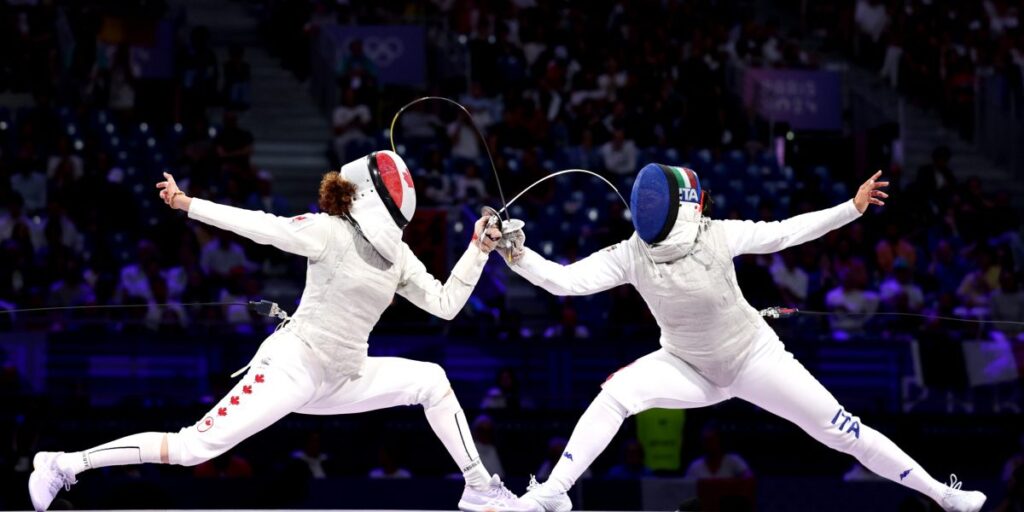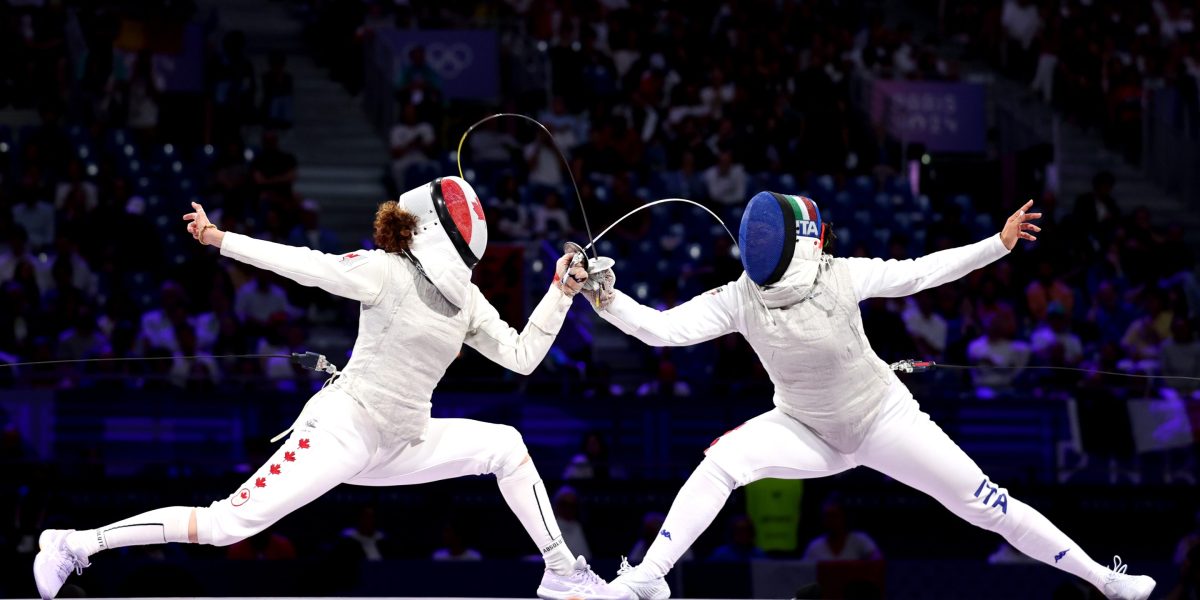The reason you’re hooked on obscure sports at the Paris Olympics? Artificial intelligence
Intel’s AI is using crowd noise to find highlights from thousands of hours of footage, giving fencers and speed climbers a boost.


As you scroll through social media or channel surfing the Paris Olympics this year, you might find yourself more invested than normal in a tense round of fencing or 69-year-old Aussie equestrian Mary Hanna’s bid at gold.
They may have Intel, the computing giant eventually left behind by Microsoft in the wake of the last big tech wave, to thank.
The AI Olympics
As the first Olympics since the advent of generative AI, Paris serves as the ultimate testbed for semiconductor maker Intel to demonstrate its tech capabilities.
The group has been using “digital twins,” which allows it to create replicas of the various stadiums across Paris to help with planning before the Olympics even started.
It has also been showcasing a talent identification network, which pairs young athletes with their ideal Olympic sport based on agility, endurance, and power. The group has an interactive showroom at the Stade de France arena where spectators can identify their niche.
But one innovation professional athletes from less popular sports might be cheering on is Intel’s use of AI to create highlights.
Intel is using AI to automatically pick out highlight reels for Olympic sports, which go to broadcasters to help them quickly pull together a broadcast package. The technology mainly relies on the noise of crowds to highlight key moments, for example a shot on goal in football or the closing stages of swimming races.
The technology is similar to that implemented by IBM at Wimbledon, where crowd noise helps find big plays quickly so broadcasters can pick the best bits from a trove of footage.
That might help lower-ranked players, who are warring it out on Court 17, far from the cries of center court, for example, get more recognition for a winning point.
The aim of the Olympics AI is similar, but under the much more strenuous conditions of digging through tens of thousands of hours of footage across 40 different sports.
Its payoff, however, might be greatest for athletes in lower-profile sports like table tennis, speed climbing and equestrian.
“Traditionally, both the editing of that and the highlights, but also just the consumption of that across the different platforms, meant that they could only get to a certain amount of sports,” Dermot Hargaden, Intel’s EMEA president, told Fortune.
“But now, with the assistance that they’re getting, they’re able to widen that lens much more.”
It’s not new that obscure sports get a profile boost every four years as their athletes fight for a medal. Even at the more popular end, swimmers, track & field competitors, and gymnasts enjoy coverage levels of magnitude higher than outside the Olympic cycle.
However, this is increasingly less assured.
As the Olympics has introduced more mainstream sports, namely golf, to the calendar in recent years in a bid to maintain relevance, there is a risk of the more traditional, obscure sports being pushed out of the mix.
Add to that the arrival of other alternative sports, like Breaking’s debut at the Paris Olympics, and the fight for eyeballs becomes all the tougher.
“One of the objectives that we had with the IOC was that we’d have accessibility to perhaps some of the lesser in popularity sports, which maybe didn’t get as much time as what we might consider to be the key event,” added Hargaden.
“We don’t know whether it means that that sport gains more popularity or has increased viewership. We’ll have to see over time, but that was part of the intent.”
Hargaden reiterated that the goal was to increase accessibility rather than drive viewership to or from any particular sport.
Light bulbs going off
As the AI wave moves from case studies to wider rollouts, many companies are still determining how the tech will serve them.
For Intel, the games aren’t just a way to showcase its sporting acumen but also to show clients how they can adopt AI for various operations.
“As we bring customers through that tech salon, just in that room, you can see light bulbs going off with respect to, ‘I never thought of it that way.’”
Hargaden sees Intel’s solutions for the Olympics as analogous to everyday problems businesses face in all sectors, given the variety of use cases at the games.
“I think that’s what that’s transferable to businesses, is know what you’re going to do with it, know that it’s not one thing. And then you start to get really, really clear on the use case and what the benefit is that you’re trying to achieve.”
In the meantime, if AI can help turn the spotlight to part-time athletes in poorly-funded sports, Paris’s uncertain Olympic legacy will have at least one more benefactor.





